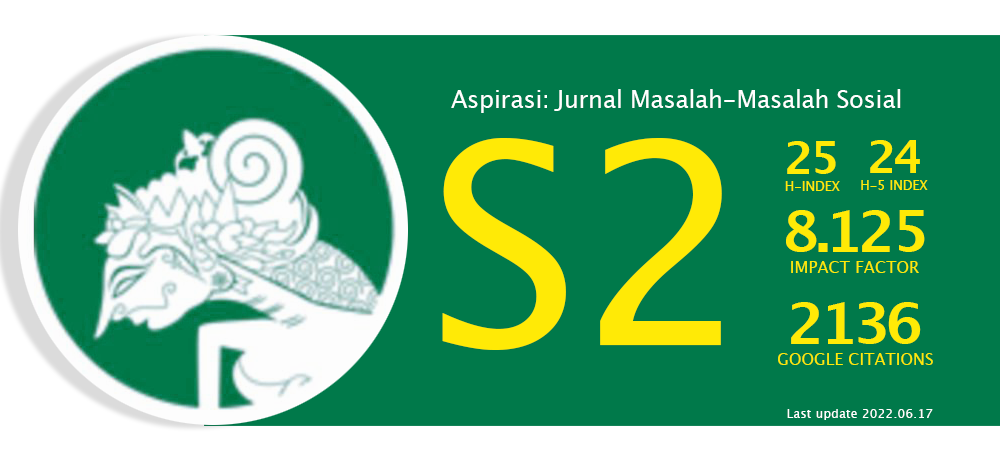Urgensi Revisi Undang-Undang tentang Kesejahteraan Lanjut Usia
Abstract
At present we are witnessing an increasing population of the world's elderly. The World Health Organization (WHO) calls this phenomenon as humanity’s greatest triumph. Indonesia is one of the countries with the most elderly population in the world. The WHO predicts that in 2025 Indonesia will occupy the fifth position with the highest percentage of elderly people in the world. This article tries to answer what is the latest scientific study of the elderly? What should be the category limit old age in Indonesia? Is the revision of the Law Number 13 of 1998 concerning Elderly Welfare (the Elderly Act) is urgent to do? Finally, what is the role of the Indonesian Parliament on this issue? The researcher uses a qualitative method with a combination of interview techniques and literature studies. This article tries to answer what is the latest scientific study of the elderly? What should be the category limit old age in Indonesia? Is the revision of the Law Number 13 of 1998 concerning Elderly Welfare (the Elderly Act) is urgent to do? Finally, what is the role of the Indonesian Parliament on this issue? So if there is an elderly bonus, the burden on productive people will be heavier. Gerontologists introduce the concept of active aging as a solution. A concept that invites us to see the elderly not as burdens but people with economic and social potential. A solutive, comprehensive and implementative policy that is supported by implementers at the central, regional, and community level will make the bonus of the elderly a blessing. Therefore, the revision of Law No. 13 of 1998 on Elderly Welfare is urgently called for, with several important things that must be included, namely the principle of humanity, the rights of the elderly, elderly data collection, and economic protection for the elderly.
Abstrak
Saat ini kita sedang menyaksikan meningkatnya populasi lanjut usia (lansia) di dunia. World Health Organization (WHO) menyebut fenomena ini sebagai kemenangan terbesar umat manusia. Indonesia merupakan salah satu negara yang mempunyai populasi lansia terbanyak di dunia. WHO memprediksi bahwa pada tahun 2025 Indonesia akan menempati posisi kelima negara dengan persentase lansia tertinggi di dunia. Artikel ini mencoba menjawab bagaimanakah kajian ilmiah terkini tentang lansia? Berapakah sebaiknya batasan kategori usia lansia di Indonesia? Apakah revisi Undang-Undang Nomor 13 Tahun 1998 tentang Kesejahteraan Lanjut Usia (UU Lansia) mendesak untuk dilakukan? Terakhir, bagaimana peran DPR RI mengenai isu ini? Peneliti menggunakan metode penelitian kualitatif, yaitu dengan kombinasi teknik wawancara dengan pakar dan kajian literatur. Berdasarkan perhitungan dependency ratio oleh BPS, pada tahun 2020 ini 100 orang usia produktif menanggung beban 48 orang non-produktif, sehingga jika terjadi bonus lansia maka beban orang produktif akan semakin berat. Para ahli gerontologi memperkenalkan konsep active ageing sebagai solusi. Sebuah konsep yang mengajak kita memandang lansia bukan sebagai beban melainkan orang-orang yang potensial secara ekonomi dan sosial. Sebuah kebijakan yang solutif, komprehensif dan implementatif yang didukung oleh para pelaksana di tingkat pusat, daerah, dan unsur masyarakat akan menjadikan bonus lansia sebagai berkah. Karena itu revisi UU Lansia mendesak dilakukan, dengan beberapa hal penting yang harus dimasukkan, yaitu prinsip kelanjutusiaan, hak-hak lansia, pendataan lansia, dan proteksi ekonomi bagi lansia.
Keywords
Full Text:
pdfReferences
Al Amin, M. (2017). Klasifikasi Kelompok Umur Manusia Berdasarkan Analisis Dimensi Fraktal Box Counting Dari Citra Wajah Dengan Deteksi Tepi Canny. MATHunesa (Jurnal Ilmiah Matematika), 2(6).
Astuti, I. (2018, May 24). Kemensos Dorong Revisi UU Lansia. Media Indonesia. Retrieved from https://mediaindonesia.com/read/detail/162798- kemensos-dorong-revisi-uu-lansia, on May 30, 2020.
Azzahro, F. D. & Rosyid, F. N. (2016). Hubungan antara tingkat depresi dengan kualitas hidup lanjut usia di Panti Wredha Dharma Bhakti Pajang Surakarta. Universitas Muhammadiyah Surakarta (Naskah Publikasi).
Badan Pusat Statistik. (2019). Statistik Penduduk Lanjut Usia 2014. Jakarta: Badan Pusat Statistik.
Badan Pusat Statistik. (2014, February 18). Dependency Ratio menurut Provinsi, 2010– 2035. Retrieved from https://www.bps.go.id/ statictable/2014/02/18/1275/dependency-ratio- menurut-provinsi-2010-2035.html, on June 25, 2020.
Baron, R. A. & Byrne, D. (2004). Social Psychology (10th Edition). New Delhi: Pearson Education.
Bloom, D., Canning, D., & Malaney, P. N. (1999).
Demographic change and economic growth in Asia. CID Working Paper Series.
Cherry, K. (2018, June 5). Erik Erikson’s stages of psychosocial development. Retrieved from https://www.verywellmind.com/erik-eriksons- stages-of-psychosocial-development-2795740, on April 5, 2020.
Cicih, L. H. M. (2020). Pengumpulan Data RUU Lansia/Pewawancara: Tim RUU Lansia BKD, Badan Keahlian DPR RI.
Costa, L. & Veloso, A. (2015, June). The gamer's soul never dies: Review of digital games for an active ageing. In The 2015 10th Iberian Conference on Information Systems and Technologies (CISTI) (pp. 1–6). IEEE.
Forman, D. E., Berman, A. D., McCabe, C. H., Baim, D. S., & Wei, J. Y. (1992). PTCA in the elderly: The “young-old” versus the “old-old”. Journal of the American Geriatrics Society, 40(1), 19–22. doi:10.1111/j.1532-5415.1992. tb01823.x. PMID 1727842.
Fry, C. L. (1976). The ages of adulthood: a question of numbers. Journal of Gerontology, 31(2), 170– 177.
Hakim, L. N. (2020). Perlindungan Lanjut Usia Pada Masa Pandemik Covid-19. Info Singkat, XII (10/ II/Puslit/Mei/2020).
Hurlock, E. B. (2001). Developmental psychology. New Delhi: Tata McGraw-Hill Education.
Kirkwood, T. (1996). Mechanisms of Ageing. In Ebrahim S and Kalache A (eds), Epidemiology in Old Age. London: BMJ Publishing Group
Lestari, M. D. (2020). Pengumpulan Data RUU Lansia/Pewawancara: Tim RUU Lansia BKD, Badan Keahlian DPR RI.
Mahadewi, I. G. A. (2018). Hubungan Tingkat Depresi Dengan Kualitas Hidup Pada Lansia Di Panti Sosial Werdha Wana Seraya Denpasar Bali. E-Jurnal Medika Udayana, 7(8), 1–8. Retrieved from https://ojs.unud.ac.id/index.php/ eum/article/view/41632
National Institute on Aging. Social isolation, loneliness in older people pose health risks. Retrieved from https://www.nia.nih.gov/news/ social-isolation-loneliness-older-people-pose- health-risks, on April 28, 2020
Orimo, H., Ito, H., Suzuki, T., Araki, A., Hosoi, T., & Sawabe, M. (2006). Reviewing the definition of “elderly”. Geriatrics & gerontology international, 6(3), 149–158.
Peel, N., Bartlett, H., & McClure, R. (2004), Healthy ageing: how is it defined and measured?. Australasian Journal on Ageing, 23: 115-119. doi:10.1111/j.1741-6612.2004.00035.x.
Purnamawati, D. (2019, July 10). 60 Tahun Termasuk Produktif Mensos Minta Usia Lansia Direvisi. Antara Bengkulu. Retrieved from https:// bengkulu.antaranews.com/berita/72346/60- tahun-termasuk-produktif-mensos-minta-usia- lansia-direvisi, on February 26, 2020.
Puspadewi, A. A. R. & Rekawati, E. (2017). Depresi berhubungan dengan kualitas hidup lansia di Panti Sosial Tresna Werdha di Jakarta. Jurnal Keperawatan Indonesia, 20(3), 133–138.
Ram, N., Gerstorf, D., Fauth, E., Zarit, S., & Malmberg, B. (2010). Ageing, disablement, and dying: Using time-as-process and time- as-resourcesmetricstochartlate-lifechange. Research in Human Development, 7(1), 27–44.
Rapih, S. (2019, September 14). Meraih Bonus Demografi Kedua. Solopos.com. Retrieved from https://www.solopos.com/meraih-bonus- demografi-kedua-1017790, on May 30, 2020.
Rowe, J. W., & Kahn, R. L. (1997). Successful Ageing. The gerontologist, 37(4), 433–440.
Schaie, K. W. (1977). Functional Age and Retirement. Paper in Symposium on social and biological aspects of retirement age, International Society for the study of behavioral development. Pavia, Italy, September 21, 1977.
TheGlobalEconomy.com. Indonesia: Age dependency ratio. Retrieved from https:// www.theglobaleconomy.com/Indonesia/Age_ dependency_ratio/, on April 28, 2020.
Utami, A. W., Gusyaliza, R., & Ashal, T. (2018). Hubungan kemungkinan depresi dengan kualitas hidup pada lanjut usia di Kelurahan Surau Gadang Wilayah Kerja Puskesmas Nanggalo Padang. Jurnal Kesehatan Andalas, 7(3), 417–423.
United Nations Population Fund (UNFPA). (2012). Ageing in the Twenty-First Century: A Celebration and A Challenge. Retrieved from https://www.unfpa.org/sites/default/files/pub- pdf/UNFPA-Exec-Summary.pdf, on February 26, 2020.
World Health Organization (WHO). (2002). Active Ageing: A policy framework (No. WHO/NMH/ NPH/02.8). Geneva: World Health Organization.
Zizza, C. A., Ellison, K. J., & Wernette, C. M. (2009). "Total water intakes of community-living middle-old and oldest-old adults". The Journals of Gerontology Series A: Biological Sciences and Medical Sciences, 64A(4): 481–486. doi:10.1093/ gerona/gln045. PMC 2657166. PMID 19213852.
DOI: https://doi.org/10.46807/aspirasi.v11i1.1589
Refbacks
- There are currently no refbacks.







